nothing here but fungus shadow rule
issue 231 - 3rd September, 2023
CJW: Hello hello, and welcome to another edition of nothing here. I'm putting this together through a migraine haze, so let's get to it shall we.
If you would like to support us, you’ve got a couple of options:
Both give you access to the full bonus archive, as well as new bonuses as they are posted. Or you can help us out by spreading the word.
The Team
Daniel Harvey (DCH) - Designer, writer, provocateur. Pro-guillotine tech critic. @dancharvey
Marlee Jane Ward (MJW) - is also Mia Walsch. Writer, apocalypse witch, goth aunt.
Corey J. White (CJW) - Author, sin-eater, future sweetie-pie.
Lidia Zuin (LZ) - Journalist, MA in semiotics, and PhD in Arts. Sci-fi writer, futurology researcher and essayist. @lidiazuin
Climate Change & The Environment
CJW: Let Venice Sink - Catherine Bennett at Wired
This idea of “transformative continuity” means that places that have been damaged by climate change can serve as a “memory” and even a deterrent, to prevent the same thing happening in the future. It also allows us to discover new heritage values in a site as it evolves. Seekamp and Jo use the example of the Gardens of Ninfa in southern Italy, where a beautiful garden was cultivated in the ruins of an abandoned medieval city, giving the site a “renewed living heritage” that both celebrates its history and endows it with new values of biodiversity and a flourishing ecosystem. Other studies have shown how abandoned man-made structures like harbors have proven ecologically productive, becoming unintended habitats for marine wildlife. While that it isn’t a reason to let a structure fall into ruin, it does show that there may be ancillary environmental advantages to decay.
On taking new approaches to heritage sites, both generally and as a response to the impacts climate change will have.
//
CJW: Finding Hope In The Dark Power Of Fungus - Joanna Steinhardt at Noema
Fungi — with their delicate, wisp-like threads of mycelium and their hobbit-home fruit bodies — offer another perspective. They embody an ecological paradigm of objects and phenomena in relationship with their surroundings, as part of feedback loops and lifecycles, in which diversity is critical to a system’s robustness.
This embodiment is key to understanding the affective experiences of wonder and enthusiasm that fungi generate. The fungal form illustrates the interwovenness of ecosystems and the realization that nothing, nor any process, can be disconnected from and unaffected by the whole. Fungi materialize such complex systems. We see this most clearly in the conceptual and practical relationship between fungi and waste. They stand as a countermodel to the inability of our present system to make sense of (to digest, so to speak) the entirety of its products.
A piece on the promise (but sadly, so far only the promise) of mycoremediation for dealing with toxins that are spilled, dumped, leeched, etc, into the environment.
//
CJW: Climate change: Mapping in 3D where the earth will become uninhabitable - (via Sentiers)
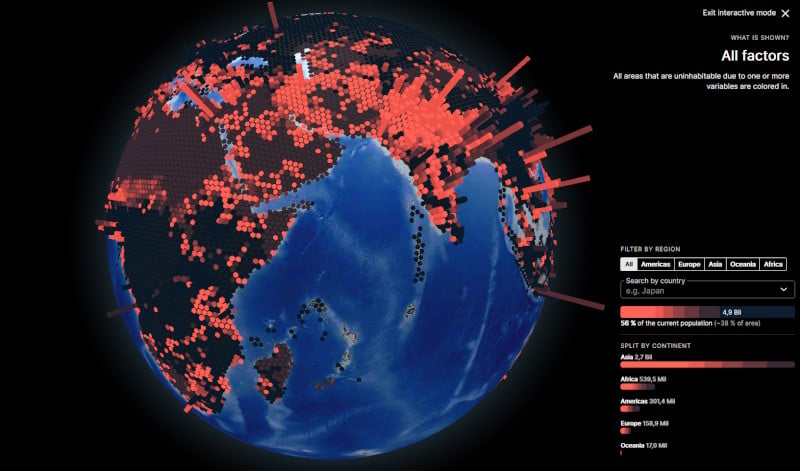
The visualisations assume scenarios that would lead to global warming between 2.5°C and 3°C by 2100 compared to pre-industrial levels, in line with predictions from the Climate Action Tracker, who base their predictions on monitoring international climate policy and action.
This is a really interesting resource - an interactive map showing the parts of Earth that will be uninhabitable by 2100 due to varying climate change factors (heat, sea level rise, availability of water, etc) if we continue along current paths. Look at your own area and… start acting in your community to build resistant networks of aid.
//
A Green Revolution In California's 'Carbon Valley' - Dara O'Rourke at Noema - "Kern County is not only a top carbon emitter but now also the state’s largest renewable energy producer. As it tries to become a leader in carbon removal, it faces a debate over who benefits from and who pays for this new economic model."
The Investment Climate - Advait Arun • phenomenalworld.org - “The world urgently needs financing for renewable energy, infrastructure, public transit, land restoration, and much more to face the storm of climate change. But these necessary capital investments in the green transition face real barriers, such as a high cost of capital or slow land acquisition. Policymakers, their critics, and investors alike are right to worry about these financial and regulatory obstacles.”
Searching For Utopia In Our Warming World - Mélissa Godin • noema - “Today, there are more than 10,000 ecovillages globally, mainly in rural areas, where people are building societies that are socially, economically and ecologically sustainable. These ecovillages are extremely diverse: they can be secular or spiritual, traditional or intentional, on or off the grid. While some ecovillages are quite radical in their politics, sharing everything from financial resources to bedrooms, others are rather mainstream, with people still living in separate homes, working day jobs but also sharing garden spaces and utilities. Despite these differences, ecovillages typically share the worldview that capitalism and industrialization have disconnected us from ourselves, each other and, especially, nature. Ecovillages are an attempt to restore these links.”
Just the headlines:
Texas electricity prices soar 6,000 percent as a fresh heat wave is expected to shatter records – Spot electricity prices jumped to $4,750 per megawatt-hour from the average of $75 - Jason Ma • desdemona despair
Louisiana Pushes Ahead With Building Carbon Pipelines in Cancer Alley - Delaney Nolan • The Intercept
Disaster Capitalists Are Circling Maui Like Buzzards - Guthrie Scrimgeour • jacobin.com
Fossil fuel subsidies in Middle East nearly doubled since 2020, says IMF - Jack Dutton at al-Monitor (via Foreign Exchanges)
Geopolitics & Empire
CJW: Amazon Is Investing in AI-Assisted Apartheid in Palestine - Ahmad Ibsais at Jacobin
[Amazon] began pouring money into Israel in 2014, the same year Israel invaded the Gaza Strip and killed two thousand Palestinians (a quarter of whom were children). Since then, Amazon has continually aided the occupation, with many illegal settlers employed by the AWS network requiring security clearance. This year alone, AI has facilitated the murder of more than two hundred Palestinians, the destruction of 290 Palestinian-owned buildings, and the displacement of thousands.
Just a gentle reminder to maybe shut down your Amazon Prime subscription and stop using it as your first (or only) shopping destination. It’s not just harm to their workers and their union-breaking efforts, they’re also facilitating and profiting from apartheid in Palestine.
//
DCH: Prigozhin’s Legacy Is the Global Rise of Private Armies for Hire - Alice Speri • The Intercept
The method by which Prigozhin was apparently killed — by downing his plane, rather than poisoning his food or causing an accidental fall from a window, both practiced ways for Russian leadership to dispatch with internal rivals — also had the effect of eliminating a potential successor to Prigozhin. Among those believed killed in the crash was Wagner’s co-founder Dmitry Utkin, a former member of Russia’s intelligence services who reportedly named the group after Adolf Hitler’s favorite composer. The crash came just hours after Russia sacked Gen. Sergei Surovikin, a high-level military commander close to Prigozhin who is believed to have had advanced knowledge of the June mutiny.
My prediction: Wagner will still exist and thrive but as a de-facto state-run adjunct to Putin’s official military. I realise that’s a very subtle distinction in how they’ve always operated but there’s still something to it I think.
And of course private armies aren’t just Prigozhin’s legacy. Arguably Eric Prince has been even more instrumental in their modern rise and commercialisation.
//
DCH: Coercion and Inequality - Esfandyar Batmanghelidj • phenomenal world
Iran has been subjected to the world’s most extensive sanctions program for the better part of the last decade. Its experience is instructive: while sanctions were intended to target the country’s elite, the wealthiest households have fared far better than the poorest during the period. In fact, it appears that sanctions rigged the game, enabling a structural transformation of the economy that helped Iran’s richest households take a greater share of the nation’s wealth.
Western nations want sanctions to export capitalism to other nations. It doesn’t do that. But it sure as hell is a vector for exacerbating income inequality in those nations.
//
A horrific video sparks a national reckoning in India - Barkha Dutt • restofworld.org - “In the footage that was uploaded online in July, seen possibly by tens of millions of Indians before it was taken down, two women are paraded naked, as a mob of men push and shove them around, and several others look on approvingly. The vacant, helpless look in the eyes of the women, reeling from the shock of the assault, has become the defining picture of the collapse of law, order, and human decency in the northeastern state of Manipur.”
Just the headlines:
It’s Never a Bad Time to Remind Ourselves That Henry Kissinger Is a Murderous War Criminal - Rebecca Gordon • jacobin
Russia’s Ghost Ships and the Evolution of a Grain Smuggling Operation - Bellingcat
Far-Right Political Violence Is on the Rise in Germany - Katharina Hunfeld • jacobin
Science & Space
Why the empty atom picture misunderstands quantum theory - Mario Barbatti at Aeon - CJW: Apparently that old saw about atoms being mostly empty is incorrect, being based on a classical, not quantum, understanding of atomic structure. Full rundown of the science at the link.
Tech & Design
DCH: Elon Musk’s Shadow Rule - Ronan Farrow • The New Yorker
In the past twenty years, against a backdrop of crumbling infrastructure and declining trust in institutions, Musk has sought out business opportunities in crucial areas where, after decades of privatization, the state has receded. The government is now reliant on him, but struggles to respond to his risk-taking, brinkmanship, and caprice. Current and former officials from nasa, the Department of Defense, the Department of Transportation, the Federal Aviation Administration, and the Occupational Safety and Health Administration told me that Musk’s influence had become inescapable in their work, and several of them said that they now treat him like a sort of unelected official. One Pentagon spokesman said that he was keeping Musk apprised of my inquiries about his role in Ukraine and would grant an interview with an official about the matter only with Musk’s permission. “We’ll talk to you if Elon wants us to,” he told me. In a podcast interview last year, Musk was asked whether he has more influence than the American government. He replied immediately, “In some ways.” Reid Hoffman told me that Musk’s attitude is “like Louis XIV: ‘L’état, c’est moi.’”
Musk critics will be familiar with a lot of broad strokes and even fine details here. Still Farrow does an excellent job pulling all the disparate strings together about Musk’s outsized influence on the US Government. Which he’s bought and paid for on the back of American tax dollars via subsidies.
CJW: Related: The media's failure on Elon Musk - Paris Marx
//
DCH: How the Internet obeys you - Tara Isabella Burton • The New Atlantis
The virtual world is constituted of a series of choices — the ones we make when we click or tap, and the ones made by the people who design the clicking and tapping interfaces. In that sense it is a desire-fueled world, and mapping it out as Barba-Kay does manifests a kind of geography of what we think we want. But what appears at first glance to be a world of freedom — in contrast to the vulgarly limited, obsoletely mortal world of meatspace — turns out to be a world defined by our own personal limitations: knowledge we tell ourselves is objective when it is actually freighted with our intent; connections we tell ourselves are necessary when they are actually willed. In attempting to create something that accurately reflects reality, we have created a mirror image of our own selves.
A sterling review of Anton Barba-Kay’s book, A Web of Our Own Making. Strong echoes of critiques found in Adam Curtis films like All Watched Over By Machines of Loving Grace and Century of The Self.
//
The preponderance of the object - Rob Horning - CJW: The first section here has some great musings on the intrinsic nature of image generator systems, as defined by the images they've been trained on.
How the State Built This AI Moment - Tess Doezema, Nina Frahm • The New Atlantis - “But the idea is strikingly inaccurate, obscuring as it does the important role of human actors, institutions, and policies in creating novel, transformative technologies. What we lose by describing the world in this manner is not only a clear understanding of social and technological change; we lose the opportunity for public debate about the most significant decisions regarding AI and human wellbeing.“ (DCH: Good read on the myth that law and policy lags behind tech. The lack of regulation is by design of capitalist governments.)
Most of My Instagram Ads Are for Drugs, Stolen Credit Cards, Hacked Accounts, Counterfeit Money, and Weapons - Jason Koebler • 404 Media - “The ads are a window into a blatantly illegal underground economy that Meta is not only failing to moderate, but is actively profiting from and injecting into users’ feeds.” More: Instagram Throttles 404 Media Investigation Into Drug Ads on Instagram
Just the headlines:
School district uses ChatGPT to help remove library books - Andrew Paul • Popular Science
Elon Musk to strip headlines off news links on Twitter in latest overhaul - Kari Paul • The Guardian
Twitter appears to delay links by five seconds to sites Elon Musk dislikes - Abené Clayton • The Guardian
The new economics of Twitter outrage - Garbage Day • Ryan Broderick
Society & The Culture
MJW: How Mastercard is Endangering Sex Workers by LaLa B Holston-Zannell at ACLU.org
In an attempt to comply with the Mastercard policy, adult content websites are putting in place all sorts of burdensome and sometimes impossible barriers. Many now require adult content producers to verify their identity through biometrics systems, a service that Mastercard now offers and benefits from financially. And these biometrics services have a long record of racist implications.
Deplatformed by socials, de-banked by financial institutions, and discriminated by payment processor, sex workers just can’t cop a fucking break.
//
DCH: California Gothic - Andrew Marzoni • The Baffler
Alongside the cynical cryptographers of L.A.’s songwriting renaissance in the 1960s and 1970s, from Neil Young and Randy Newman to Warren Zevon and Tom Waits, and successive generations of artists, these are the architects of a California Gothic unique from but no less idiosyncratic than its European and Southern relatives. The urban fog that has trailed shibboleths of progress to the Pacific Rim hovers over a reflection in once-clear water that looks final in its murkiness: finding the barbarisms of modernity exacerbated and multiplied on the outer cusp of the American continent, settled under the false assurance of beginning anew, we can no longer dispute that the monsters are us. It is through Del Rey, a moody transplant with a made-up name, that this lineage finds its most opportune and poignant expression. A damsel in distress inured to the fatalism of our time, her songbook is a secular Revelation for the coming fall, illusions of redemption having all but burned out.
A brilliant enunciation of Lana Del Rey’s vision of Los Angeles with detours down highways and byways of film noir, LA history, and more.
//
the plight of the vibe tourist - Alexi Gunner (via Sentiers) - CJW: An interesting piece on vibes-based tourism of the TikTok generation.
Just the headlines:
Christianity Today Editor: Evangelicals Call Jesus “Liberal” and “Weak” - Tori Otten • The New Republic
The strange, secretive world of North Korean science fiction - Ars Technica
For the Jacksonville Shooter, Dollar General Was an Easy Target - Alex N. Press • jacobin
Health, Cooking, and Related
CJW: Alabama Trans Health Care Ruling Is a Worrying Omen for Future SCOTUS Decision - Natasha Lennard at The Intercept
That is, trans youths have no right to the medicine they need because that medicine is not hundreds of years old. The decision also implies that the same logic could also be used to find bans on adult trans health care unconstitutional.
[...]
To demand that unenumerated rights be “deeply rooted” in U.S. “history and tradition” is, after all, to insist that only the rights of propertied white men are recognized as fundamental — as Alito and his Christo-nationalist allies well know.
More disgusting attacks on trans rights (and any progressive notion of rights more generally) coming from US conservative judges.
//
DCH: Americans face an epidemic of loneliness. For some, supermarket self-checkouts make it worse - Marisa Gerber • Los Angeles Times
The weekly interactions with Hechler provide a steady spark of joy in Myers’ routine, which she has tried to maintain in the months since her husband died. The couple — he dressed casually, she in heels and neatly coiffed hair — shopped together on Fridays for years, always picking out two steaks for dinner before checking out in Hechler’s lane. After his death, Myers gave Hechler a copy of the eulogy she read at his funeral, a gesture so thoughtful it drove the longtime cashier to tears.
I abhor self-checkouts. They’re a brazen money grab from corporations that get you to happily do a job that would otherwise help put food on someone else’s table. The broader societal effects are an exacerbation of loneliness for those most at risk of it already, and an erosion of empathy and a corresponding increase in capriciousness as a result for everyone else.
//
The FBI Has Collected DNA Profiles for 21 Million People - Ken Klippenstein • The Intercept - “When we’re talking about rapid expansion like this, it’s getting us ever closer to a universal DNA database.”
Just the headlines:
How Modernity Made Us Allergic - Theresa MacPhail and Theresa MacPhail • noema
Federal Study Links Testicular Cancer to ‘Forever Chemicals’ - Hannah Norman • undark
The Mystery of Long COVID Is Just the Beginning - Lisa Miller • New York Magazine
Labour & Economics
DCH: The Human Cost of Cryptomania - Zeke Faux • Bloomberg
Some victims I spoke with were held in a giant compound, called Chinatown, in Sihanoukville, in southwestern Cambodia. From photos, it looked as large as a city’s downtown. It had dozens of tall, drab office towers, arrayed around a few courtyards and surrounded by high gates, security cameras and concertina wire. Armed guards dressed in black stood outside.
At street level were noodle shops, convenience stores, barber shops—many of them with signage in Chinese, rather than the local Khmer. Photos posted by one confused tourist showed that the shops were bisected by metal gates, preventing anyone who entered through the back door from exiting through the front. Local news reports described a string of suspicious deaths near Chinatown—one body was found hanging at a construction site, and another corpse was dug up handcuffed from a shallow grave in a field nearby. A local vendor told a Cambodian outlet that there had been many suicides at the complex. “If an ambulance doesn’t go inside at least twice a week, it is a wonder,” he said.
Part 1 of a series (part 2 is also out) Bloomberg seems to be running excerpting Zeke Faux’s book Number Go Up which investigates the darkest reaches of crypto.This particular story is about how thousands of people were enslaved and forced into running bitcoin and tether scams across the internet.
//
DCH: Who I’m Hurting By Shopping At Walmart - Alana Semuels • Time
Walmart is a multi-billion dollar corporation with headquarters more than 1,000 miles from my home; the money I spend there goes to shareholders and executives who live far away, instead of to my local grocery store, Key Food, an 86-year-old co-op of independently owned stores based near my home in New York. By shopping at Walmart, I am likely contributing to the demise of the independently-owned grocery store, which is disappearing across the country.
A long read on how big-box shopping fucks everyone but the poor disproportionately so. Touches on the Depression-era Robinson-Partman Act, how Ralph Fucking Nader was key in preventing its enforcement for the last several decades, and how the FTC is revving up for a fight to bring it back.
//
A key feature of NFTs has completely broken - Alex Castro The Verge “OpenSea, the biggest NFT marketplace still fully enforcing royalty fees, said today that it plans to stop the mandatory collection of resale fees for artists. Starting March 2024, those fees will essentially be tips — an optional percentage of a sale price that sellers can choose to give the original artist. If the seller doesn’t want to hand over any money, that’ll be their choice.”
Surge pricing has lost all meaning - Ali Griswold oversharing.substack.com “The dominant ride-hail pricing model now is this: companies like Uber and Lyft charge one price to the rider, based on what they think that rider might pay, and offer another rate to the driver, based on what they think that driver might accept. Then they pocket the difference. The benefits to the platform are obvious. In the old world of pricing, Uber and Lyft promised drivers a fixed cut of the fare. Changing that rate would invariably spur protests and outrage, no matter how much Uber assured drivers that cutting fares would help them earn more. Upfront pricing decoupled what the rider pays from what the driver earns. The companies no longer have to pay a certain share or explain themselves when that share changes. The wider the gap between the upfront fare and upfront pay, the more the company earns.”
Just the headlines:
How Amazon’s In-House First Aid Clinics Push Injured Employees to Keep Working - Caitlin Harrington at Wired
Women were celebrated as the face of gig work in Pakistan. They’re quitting the industry - Zuha Siddiqui • Rest of World
B.S. Jobs and the Coming Crisis of Meaning - Brian J.A. Boyd • The New Atlantis
Books
MJW: Pet Semetary by Stephen King
I’ve diverted from my usual SK audiobook re-listens by listening to one I haven’t read before. The nice thing about SK is there are always more books of his I haven’t read, and I’ve not come across one that I didn’t at least enjoy a little, or admire his character development. Daddy King calls Pet Semetary his most frightening book, and I can understand that if you’re a parent, it would be. It’s about the precariousness of life, grief, and the destruction of a family. And it’s fucking scary. TW for child and animal death, and some truly horrific scenes.
//
LZ: The Hidden Life of Trees, by Peter Wohlleben
Honestly I’m not sure if I already mentioned this book here, but I only finished it last week, so I can give a proper opinion. And it’s great. I want to read the other books Wohlleben has written about animals and even more about trees. I learned so much about how trees organize themselves and it was great to check all that information in the park near my apartment. I spent some time being a (bigger) weirdo checking for knots in branches so I could tell how old trees were, and that was a good timing because it is also summer in Sweden. In Brazil, seasons are not very different, so you don’t necessarily see trees getting reddish during autumn or lose most of their leaves during winter, whereas here in Sweden the changes can be pretty drastic. Living in the southern part makes it more subtle than in the north, of course, but it was interesting to be reading this book while one of the biggest storms happened in Scandinavia – to the point that there floods in Norway and that’s really unusual. I guess this is the kind of book that changes your view over things after you finish it.
Movies + TV
LZ: You Won’t Be Alone
Saw a video of this on TikTok and decided to check it out. I mean, it’s the story of a peasant girl who is raised by a witch and she can transform into anything she wants, so she lives different lives and see the world from different perspectives and there’s Noomi Rapace. Sort of. Of course they sell the movie after her, but she has a really short screen time – no less impressive though. This movie was the debut of the Macedonian director Goran Stolevski and I think it’s safe to say he’s like Terrence Malick but make it pagan. Most of the time the film is about contemplation of life, existence, and identity against beautiful landscapes of the Macedonian countryside. Even though they could have wanted to be deep into womanly issues and even give a feminist tone to the story, I don’t think that works very well. There’s still the duality between the evil witch that was once an unhappy bachelorette and now she just wants to avenge her bitterness over other people. The protagonist, despite all harshness, finds her way through society and even finds love, which is unacceptable to the witch or to this major cosmic idea that life is suffering and can always and only be suffering. The ending made me a bit confused because it could open to moralistic conclusions, but I won’t go further than that or I might spoil others’ experience.
CJW: I recommended this one a while back - well worth seeing for yourself.
Music

Although it is described as black metal, it’s really not your conventional kind. Maybe because it’s in Japanese and there’s quite a few moments where you hear clean vocals instead of guttural? I don’t know, but this album took me back to teenage years when I scavenged Soulseek folders and forums like Japanese alternatives, hunting for anything that was unusual. Though Asunojokei sounds close to bands like Deafheaven, Bosse-de-Nage, MØL, I still think there’s a freshness that comes from the fact that this is a Japanese band. I don’t know how to explain. It’s like Dir en Grey or MUCC covers Deafheaven or something. Also, the cover arts are beautiful and unlike the average dark, medieval stuff we find in the West.
Art
MJW: Robin Eisenberg
I’m in love with Robin Eisenberg’s colourful worlds of shapely forms and night skies. Those colour palettes!

The Memes
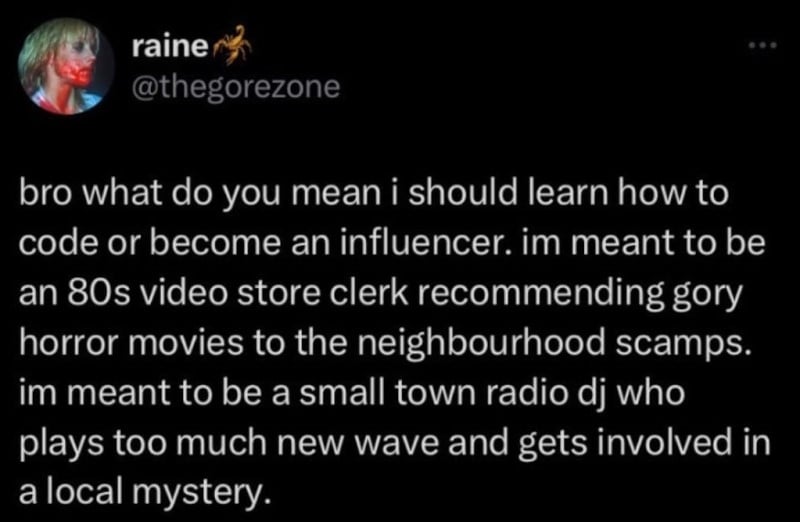

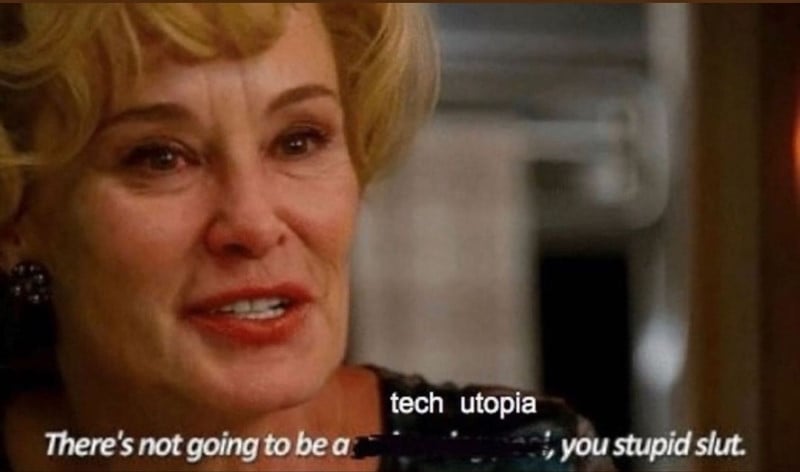


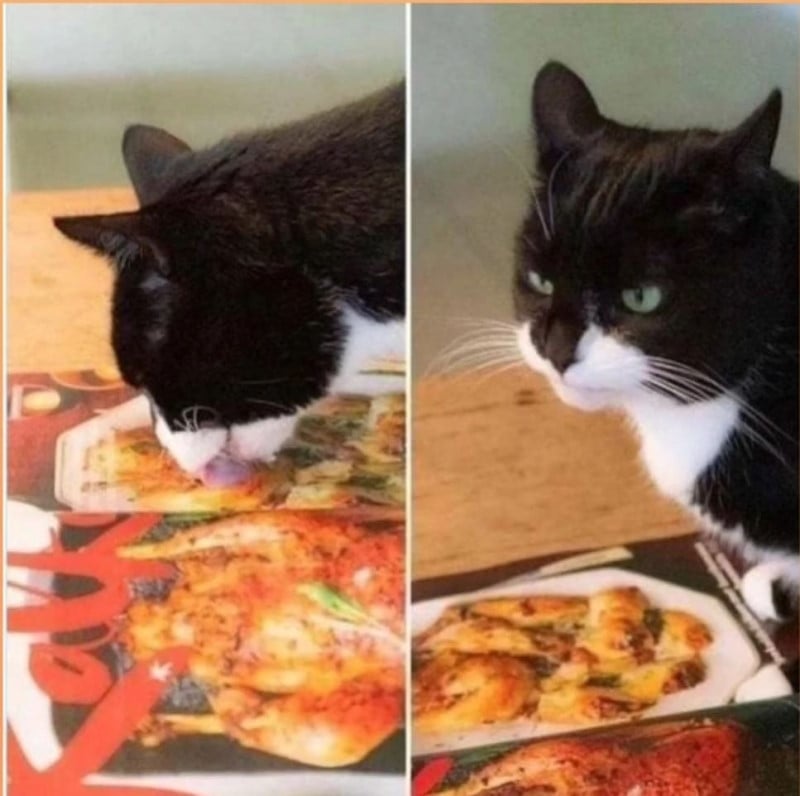
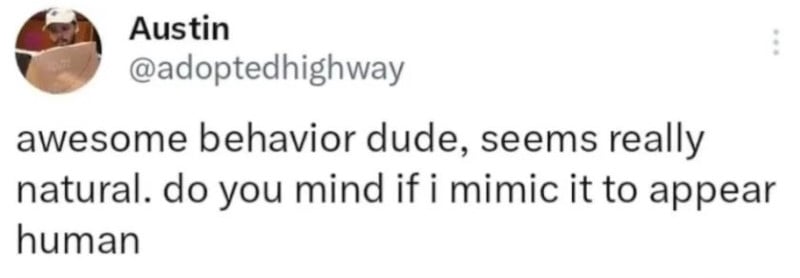
You just read issue #231 of Nothing Here. You can also browse the full archives of this newsletter.